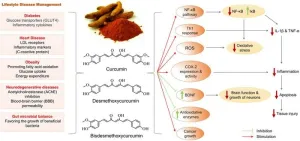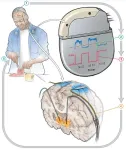(Press-News.org) Research has shown that in many animals, the winners of a fight are more likely to win subsequent contests, while the losers tend to lose their following fights. In experiments where male stickleback fish were randomly introduced to another fish, 65% of the winning fish won the second match, while all losing fish lost the second contest.
Such winner and loser effects can greatly influence individual behavior and fitness. This effect happens in humans as well. In "Winner and Loser Effects and Social Rank in Humans," recently published in The Quarterly Review of Biology, authors Noah M. T. Smith and Reuven Dukas provide a narrative review of the relevant similarities and distinctions between nonhumans and humans to assess the causes and consequences of winner and loser effects in humans.
The authors review winner and loser effects and their adaptive significance in nonhumans, including chimpanzees and fruit flies, and review additional factors that influence social rank in nonhumans and humans. The two-way interactions between social rank and winner and loser effects can alter cognition and behavior in various domains.
They then evaluate the potential role of such winner and loser effects and their social consequences. In nonhumans and humans, winner and loser effects may guide individuals to behave according to their apparent social rank, with winners adopting assertive postures and losers becoming submissive. While physical formidability is the dominant dimension determining social rank in nonhuman species, in adult humans, social conventions, physical attractiveness, competence in complex skills, and social competence are more important for social rank.
Recent studies have explored winner and loser effects in humans competing in sports. Smith and Dukas tested winner and loser effects using first-person shooter video games and a reading comprehension assignment. Randomly assigned video game winners performed significantly better in the second phase than did randomly assigned first-phase losers, and first-phase high scorers had higher reading scores in the second phase than first-phase low scorers.
The authors note that "our experimental protocol, which involved random assignment of participants to winner and loser treatments, is crucial for ruling out selection bias, whereby better performers simply win against weaker opponents in successive contests."
Future lines of research may provide further understanding of how and why winner and loser effects shape human cognition, mood, and behavior. These findings can provide additional implications in areas such as "red shirting" (the effect of enrolling children in school at a later age), winner and loser effects in investment banking and gambling, and the mood effects of winning and losing.
The premier review journal in biology, The Quarterly Review of Biology has presented insightful historical, philosophical, and technical treatments of important biological topics since 1926. The QRB publishes outstanding review articles of generous length that are guided by an expansive, inclusive, and often humanistic understanding of biology.
Contact: Mallory Gevaert / mgevaert@uchicago.edu
END
How "winner and loser effects" impact social rank in animals - and humans
2024-08-19
ELSE PRESS RELEASES FROM THIS DATE:
Research study examines Alzheimer’s disease drug on tissue samples from people with Down syndrome
2024-08-19
People with Down syndrome are likely to develop Alzheimer’s disease at a young age, with autopsy studies showing that by age 40 years, the brains of individuals with Down syndrome have amyloid plaques. Yet people with Down syndrome have been excluded from or underrepresented in clinical trials of new therapies for treating AD. Lecanemab, which has been shown to target and remove beta-amyloid plaques, has been approved by the U.S. Food and Drug Administration to treat AD early in the disease’s progression. ...
International Society of Biomechanics recommendations for wearables-based motion capture
2024-08-19
Dr. Reed Gurchiek, an Assistant Professor in the Department of Bioengineering, Clemson University, and an Early-stage Investigator, was a co-first author of a recent publication in the Journal of Biomechanics titled “International Society of Biomechanics recommendations on the definition, estimation, and reporting of joint kinematics in human motion analysis applications using wearable inertial measurement technology”. A collaborative effort that incorporated feedback from the biomechanics community has produced recommendations in five categories: sensor characteristics ...
Rutgers researchers discover new way to control the sense of touch
2024-08-19
Rutgers researchers have found a new way to manage the receptors that control the sense of touch, which could lead to treating chronic pain more effectively.
“Identifying a natural molecule that specifically reduces pain sensitivity offers hope for new therapeutic strategies in the management of pain,” said Tibor Rohacs, a professor in the Department of Pharmacology, Physiology and Neuroscience at Rutgers New Jersey Medical School and a member of the Rutgers Brain Health Institute. “Our goal is to translate these findings into effective treatments that improve the quality of life for people suffering from chronic ...
New UH study targets early signs of vision loss in diabetic patients
2024-08-19
A $3.3 million study at the University of Houston College of Optometry will track the health of patients with prediabetes and diabetes to find out who might develop eye problems and be at risk for future vision loss. The study is being led by Wendy Harrison, associate professor, and is underwritten by the National Eye Institute.
Vision loss in type 2 diabetes results from diabetic retinopathy, caused by damage to blood vessels in the retina, the light-sensitive layer of tissue in the back of your eye. The disease can appear without warning.
“The ...
Herbal-based nutraceuticals in management of lifestyle diseases: Experience from Indian population
2024-08-19
Lifestyle diseases, also known as non-communicable diseases (NCDs), have emerged as a major health burden globally, including in India. These diseases, such as obesity, diabetes, hypertension, cardiovascular diseases, and metabolic disorders, are primarily caused by unhealthy lifestyle choices like sedentary behavior, poor dietary habits, and stress. According to the World Health Organization (WHO), NCDs are responsible for 41 million deaths annually, accounting for 74% of all global deaths. Notably, 86% of these premature deaths occur in low- and middle-income countries.
The increasing prevalence of lifestyle diseases ...
Taming Parkinson’s disease with intelligent brain pacemakers
2024-08-19
Media Contact: Robin.Marks@ucsf.edu, (415) 502-6397
Subscribe to UCSF News
Taming Parkinson’s Disease with Intelligent Brain Pacemakers
UCSF studies show personalized, self-adjusting, neuromodulation has the potential to enhance movement and sleep.
Two new studies from UC San Francisco are pointing the way toward round-the-clock personalized care for people with Parkinson’s disease through an implanted device that can treat movement problems during the day and insomnia at night.
The approach, called adaptive deep brain stimulation, or aDBS, uses methods derived from AI to ...
Self-adjusting brain pacemaker may help reduce Parkinson’s disease symptoms
2024-08-19
A small feasibility study funded by the National Institutes of Health (NIH) found that an implanted device regulated by the body’s brain activity could provide continual and improved treatment for the symptoms of Parkinson’s disease (PD) in certain people with the disorder. This type of treatment, called adaptive deep brain stimulation (aDBS), is an improvement on a technique that has been used for PD and other brain disorders for many years. The study found aDBS was markedly more effective at controlling PD symptoms compared to conventional DBS treatments.
“This study marks a big step forward towards ...
Florida’s red flag gun law and firearm and nonfirearm homicide and suicide rates
2024-08-19
About The Study: Although firearm homicide mortality increased after Florida’s red flag law enactment (permitting the temporary removal of firearms by law enforcement officers from individuals posing a danger to themselves or others), this increase was lower than expected compared with its synthetic control, resulting in an 11% rate reduction (0.73 fewer deaths per 100,000). There were no differences from expected mortality rates for nonfirearm homicide, firearm suicide, or nonfirearm suicide.
Corresponding Author: To contact the corresponding author, Catherine Gimbrone, MPH, email c.gimbrone@columbia.edu.
To ...
Number of pediatric inpatient psychiatric beds in the U.S. did not increase 2017-2020 despite youth mental health crisis
2024-08-19
U.S. pediatric inpatient psychiatric bed capacity did not change 2017 – 2020, despite increases in pediatric mental health emergency visits, according to a study published in JAMA Pediatrics. Researchers also found substantial geographic variation in inpatient psychiatric bed capacity per 100,000 children, ranging from zero in Alaska to 75 in Arkansas. Over 90 percent of pediatric inpatient beds are in urban centers, raising concerns for youth living in rural areas.
“Access to psychiatric inpatient care for youth is insufficient to meet the growing demand, forcing patients to wait for hours or even days in emergency departments or on medical units until a psychiatric bed becomes ...
Using temporary nurses doesn’t mitigate deaths linked with staff shortages
2024-08-19
A new study led by the University of Southampton has found that using temporary nursing staff to fill rotas only partially combats an increased risk of patient death associated with staff shortages.
Researchers found that avoiding low nurse staffing levels lowers the risk of death among patients – particularly even when drafting in temporary registered nurses to maintain staffing levels. However, despite this, the risk of death remains elevated compared to when the ward is fully staffed by permanent nurses.
Findings from the ...


